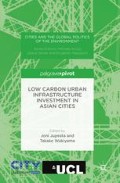Abstract
This study presents the results of a modelling study on greenhouse gas (GHG) mitigation actions through which the DKI Jakarta energy sector may achieve “Low-carbon City in 2030” targets. The study assesses the effect of future GHG emission levels in DKI Jakarta and ways in which the DKI Jakarta provincial government may reach reduction targets by up to 30 % below the baseline level in 2030 through the Provincial Action Plan (RAD GRK). Using a back-casting approach, an energy development path is developed based on desirable goals, and we then seek ways to employ it.
The results of this study show that energy demand in DKI Jakarta has increased significantly, particularly as the result of increasing activity in the transportation and industrial sectors. Future energy city demand levels will be determined by population growth, economic development, transport demand generation, and end-use technology trends. Future energy supplies will correspond with future demands and decision-making regarding the energy supply mix and regarding technologies. Under the business as usual (BaU) scenario, final energy demand levels from 2005 to 2030 are estimated to increase 4.5 times from 6.7 mtoe (5.5 % of total consumption in Indonesia) to 27.9 mtoe, whereas primary energy supplies will increase from 11.3 mtoe to 50.1 mtoe. Under mitigation scenarios, final energy demand levels from 2005 to 2030 are estimated to increase 3.5-fold from 6.67 mtoe to 23.33 mtoe, and primary energy supplies will increase from 11.3 mtoe to 50 mtoe.
Access this chapter
Tax calculation will be finalised at checkout
Purchases are for personal use only
References
Dewi, R.G. 2012. Indonesia low carbon development strategy scenario 2050: Energy sector. Thai Environmental Engineering Journal: 63–67.
Dewi et al. 2010. Low carbon society scenario towards 2050: Indonesia energy sector. Kyoto University.
Provincial RAD GRK of DKI Jakarta. 2012. Governor Regulation of DKI Jakarta No. 131/2012, Jakarta Indonesia.
Widodo, N. 2013. Jakarta Dalam Angka (Jakarta in Figures), BPS Statistics of DKI Jakarta Province, Jakarta, Indonesia.
Acknowledgements
We thank the following institutions for supporting this research: the Asia Pacific Network (APN)—UN University, Kyoto University, IGES-Japan, NIES-Japan, and Mizuho-Japan.
Author information
Authors and Affiliations
Editor information
Editors and Affiliations
Copyright information
© 2016 The Author(s)
About this chapter
Cite this chapter
Dewi, R.G., Siagian, U., Hendrawan, I., Boer, R., Anggraeni, L., Bakhtiar, T. (2016). Low-Carbon City Scenarios for DKI Jakarta Towards 2030. In: Jupesta, J., Wakiyama, T. (eds) Low Carbon Urban Infrastructure Investment in Asian Cities. Cities and the Global Politics of the Environment. Palgrave Macmillan, London. https://doi.org/10.1057/978-1-137-59676-5_4
Download citation
DOI: https://doi.org/10.1057/978-1-137-59676-5_4
Published:
Publisher Name: Palgrave Macmillan, London
Print ISBN: 978-1-137-59675-8
Online ISBN: 978-1-137-59676-5
eBook Packages: Social SciencesSocial Sciences (R0)

